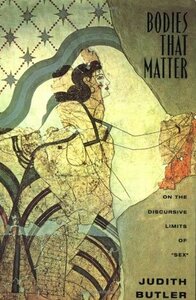Take a photo of a barcode or cover
In Gender Trouble, Judith Butler argued that gender is constructed through the performative. A common critique offered to that work was that Butler was consigning the body to the realm of the linguistic and not retaining materiality. In Bodies that Matter, Butler answers that criticism, arguing for “a return to the notion of matter, not as site or surface, but as a process of materialization that stabilizes over time to produce the effect of boundary, fixity, and surface we call matter.” (xviii) Bodies, while linguistically constructed and inscribed with notions of gender, are areas of boundary and fixity. The performative is a ritual, it is a set of practices continually enacted through which identity is formed. Butler says, “Generally speaking, a performative functions to produce that which it declares. As a discursive practice (performative ‘acts’ must be repeated to become efficacious), performatives constitute a locus of discursive production. No ‘act’ apart from a regularized and sanctioned practice can wield the power to produce that which it declares. Indeed, performative act apart from a reiterated and, hence, sanctioned set of conventions can appear only as a vain effort to produce effects that it cannot possibly produce.” (70) For Butler, there is no prediscursive subject. Our identity and subjectivity comes precisely through the linguistic construction and complex interplay of power we experience in the world.
Overall, I found this difficult book to be ultimately helpful in clarifying some of Butler's positions in Gender Trouble. I find her notion of the performative as ritual to be helpful in naming the processes by which identity is formed. I also found her interaction with Foucault's Discipline and Punish to be illuminating and helpful as well. This is a tough read, but well worth the effort.
Overall, I found this difficult book to be ultimately helpful in clarifying some of Butler's positions in Gender Trouble. I find her notion of the performative as ritual to be helpful in naming the processes by which identity is formed. I also found her interaction with Foucault's Discipline and Punish to be illuminating and helpful as well. This is a tough read, but well worth the effort.
challenging
informative
reflective
slow-paced
challenging
slow-paced
challenging
informative
reflective
medium-paced
Graphic: Homophobia, Misogyny, Racism, Transphobia, Lesbophobia
I know I will return to this book in my future readings, and hopefully then I will be more equipped with knowledge on Freudian and Lacanian psychoanalytics. I am not sure how the book is structured. I was thrilled by Butler’s introduction, attempted to read her Lacanian analysis and criticism, and really enjoyed her readings of “Paris is Burning,” Nella Larsen’s “Passing,” and drag culture. I know the latter is interesting to me for my research on mixed-race queer performativity.
Though I am kind of disappointed, Butler still inspires me, even with her book structure (which she acknowledges as fault) as she presents challenging questions and evidence. These questions are still being asked and are pushing queer, racial, and feminist discourse. I know I will be referring this book for a while.
Though I am kind of disappointed, Butler still inspires me, even with her book structure (which she acknowledges as fault) as she presents challenging questions and evidence. These questions are still being asked and are pushing queer, racial, and feminist discourse. I know I will be referring this book for a while.
In Bodies that Matter Judith Butler replies to the criticism of her earlier book Gender Trouble. She argues with the feminist thinkers who see the body as matter--a material body with a sexual specification. According to her the body does not exist beyond a cultural construction. It serves as a site for the feminist theory independently of such a pre-discursive definition. In her introduction she explains:
For surely bodies live and die; eat and sleep; feel pain, pleasure; endure illness and violence; and these “facts,” one might skeptically proclaim, cannot be dismissed as mere construction. […] But their irrefutability in no way implies what it might mean to affirm them and through what discursive means. Moreover, why is it that what is constructed is understood as an artificial and dispensable character? (xi).
The construction of bodies is a constitutive constraint, and bodies are understood through it. She states again that both body and gender are parts of discourse. The only way to reach the matter beyond discourse is through discourse itself. After all, it is the discourse that defines the body as a matter existing beyond it.
Inspired by Foucault, she contends that discourse is based on power relations and manipulated by those who control the sources of knowledge. The definition of what is natural is manipulated as well. Henceforth, the materiality of the body is discursive. The material body, its boundaries and its sexuality, materialize through the repetition of policing norms. The norms attribute meaning to it. Even the body limits are the product of social codes according to which certain practices are allowed and others are not.
Butler goes back to the concept of performativity and confirms that repeatedly performed acts normalize an attributed gender, as well as marks of race, class and sexuality. Discourse defines certain bodies as natural, thus marginalizing others. This alludes to the fact that the accepted body does not owe it to its biological characteristics but to cultural signs.
Based on Luce Iragaray’s Lacanian analysis, Butler also investigates the political coherence for which certain bodies are not legitimized. Through her own and Iragaray’s analysis of Platos’ work Timaeus, she reaches the conclusion that the marginalized bodies are related to homosexuality. She concludes that deconstruction cannot be based on already constituted references. Only a truly open debate can bring change.
For surely bodies live and die; eat and sleep; feel pain, pleasure; endure illness and violence; and these “facts,” one might skeptically proclaim, cannot be dismissed as mere construction. […] But their irrefutability in no way implies what it might mean to affirm them and through what discursive means. Moreover, why is it that what is constructed is understood as an artificial and dispensable character? (xi).
The construction of bodies is a constitutive constraint, and bodies are understood through it. She states again that both body and gender are parts of discourse. The only way to reach the matter beyond discourse is through discourse itself. After all, it is the discourse that defines the body as a matter existing beyond it.
Inspired by Foucault, she contends that discourse is based on power relations and manipulated by those who control the sources of knowledge. The definition of what is natural is manipulated as well. Henceforth, the materiality of the body is discursive. The material body, its boundaries and its sexuality, materialize through the repetition of policing norms. The norms attribute meaning to it. Even the body limits are the product of social codes according to which certain practices are allowed and others are not.
Butler goes back to the concept of performativity and confirms that repeatedly performed acts normalize an attributed gender, as well as marks of race, class and sexuality. Discourse defines certain bodies as natural, thus marginalizing others. This alludes to the fact that the accepted body does not owe it to its biological characteristics but to cultural signs.
Based on Luce Iragaray’s Lacanian analysis, Butler also investigates the political coherence for which certain bodies are not legitimized. Through her own and Iragaray’s analysis of Platos’ work Timaeus, she reaches the conclusion that the marginalized bodies are related to homosexuality. She concludes that deconstruction cannot be based on already constituted references. Only a truly open debate can bring change.
This text lived up to its reputation--challenging! Much tougher than her more recent works, and requiring a lot more psychoanalytic background. I'm definitely going to need a primer on Freud and Lacan before I come back to this.
Another book from my embodiment reading list done!
Another book from my embodiment reading list done!
challenging
informative
reflective






